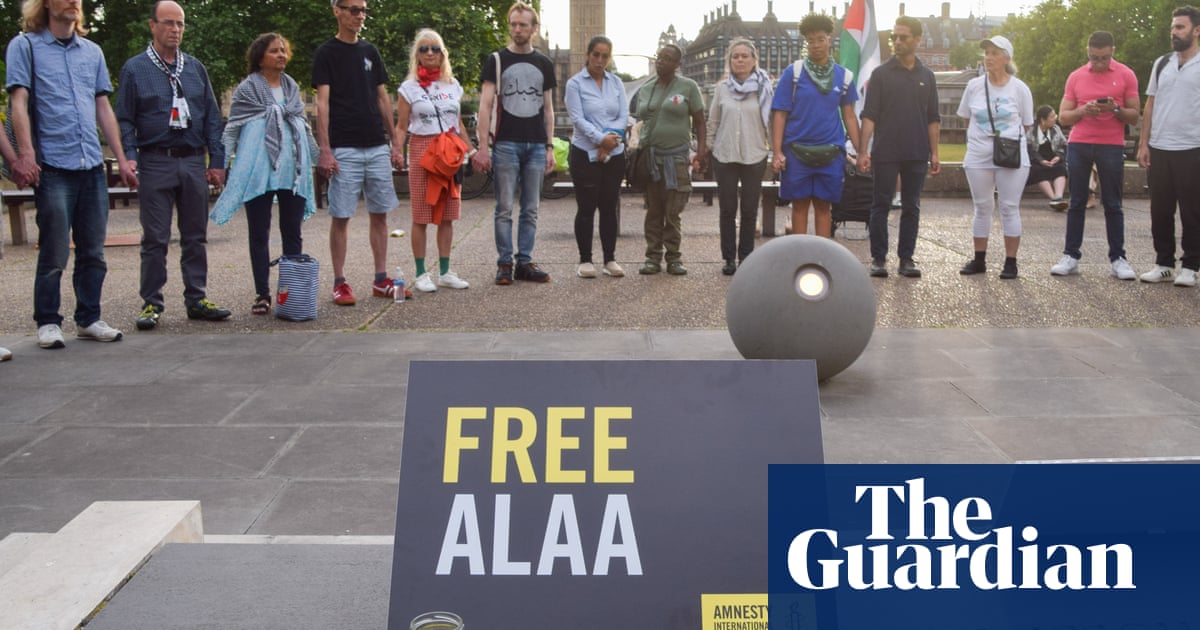The Egyptian president is refusing to take a call from Keir Starmer, knowing it will be a plea to save the life of themother of Alaa Abd el-Fattah, a famous human rights activist and British Egyptian dual national.
Laila Soueif is in St Thomas’ hospital with very low blood sugar levels as she suffers from the effect of nearly 250 days on hunger strike.
The 69-year-old is seeking the release of her son, who has spent more than 10 years in jail as a non-violent campaigner for freedom inEgypt. He should have been released in September on the completion of his last sentence. Doctors have warned she is in a highly dangerous condition, and are surprised she is conscious.
It is understood Starmer has been trying to speak to Abdel Fattah El-Sisi ever since she was hospitalised, but after taking two previous calls earlier in the crisis, the Egyptian president is so far refusing to take a third. Starmer last spoke to Sisi on 22 May, and urged him to “end the anguish of the family”.
A diplomatic source said Sisi is adamant that he does not regard Abd el-Fattah as anything to do with Britain, since he won’t recognise his dual citizenship. “One can only assume he is indifferent to what happens to his mother, but we have been relaying through all the channels available how serious and urgent this matter is,” said one government source.
The UK foreign secretary,David Lammy, has asked for options to be drawn up to demonstrate the UK’s anger at what has been happening, but the possibility that any will stick to make Sisi relent seem slim.
The UK has not upgraded its travel advice for Egypt to “dangerous”.
Starmer has enlisted the help of European allies to put pressure on Sisi to relent.
Sending a message from her hospital bed, Soueif said she was overwhelmed by those who supported her. “I feel I have reaped what I have sowed hundred fold. All that is asked (of) us is that we don’t stop fighting for what is right. We do not have to be winning, but I believe there will come a time when we prevail.”
Laila’s daughter, Sana’a, said on Tuesday that the doctors believed her mother may have found a limited pocket of energy. “She is fighting, and we hope the Foreign Office is using the time,” she said, adding that her brother is aware of his mother’s plight.
Sana’a said that along with her sister Mono, they had already told the doctors that if she loses consciousness, they would not ask to revive her.
She explained: “Our mother has told us: ‘I had a good and happy life. I had a good marriage and I had a good job and lived 69 years. I do not want to sit and watch my grandchildren’s life be stolen. It has been 10 years’.
“Of course I do not want to lose my mum, but I also do not want her to go through this hospital business again. The only reason she wants to stay alive is us. She really does not want to continue life like this and I understand it.”
She said Lammy had called for the ambassador’s access to Whitehall departments to be limited while he was in opposition. “He was very happy to say this when the Tories were in power, but it is not happening now.”
John McDonnell, the independent MP who has been at the forefront of the campaign to bring the family’s plight to parliament, said: “My concern is that we are running out of time. There is a whole range of things that specialists and diplomats have advised the government to do around trade and travel advice. There do not as yet seem to be any consequences.”
